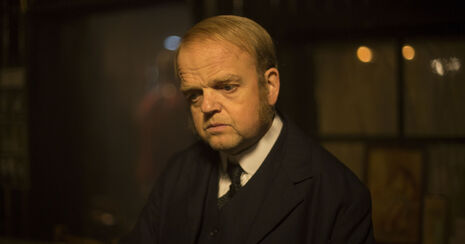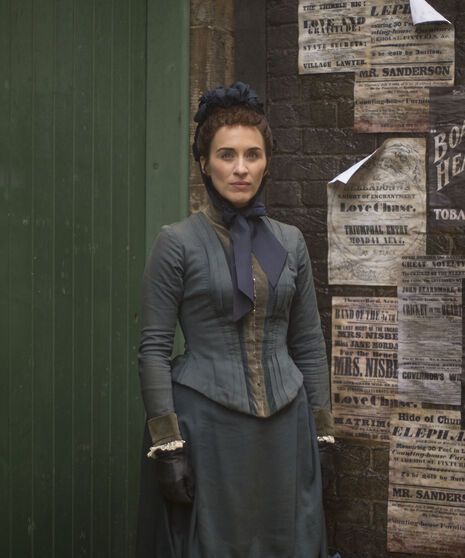TV: The Secret Agent – terror in all its aspects
The BBC’s adaptation of Conrad’s novel is an uncomfortable tale, best seen separated from the book it is based on

If ever you feel inclined to watch a TV series that will make you despair of humankind, watch Charles McDougall’s three-part adaptation of Conrad’s famous novel, The Secret Agent. The plot itself is dismal enough: the protagonist, Verloc, is told to explode a bomb by the Russian Tsarist government in order to force English powers into stamping down on anarchism, sparking a tragic series of events which devastate him and his family.
It is the chilling character portrayals that stand out in this series, one which has been roundly identified as uncomfortably and deeply contemporary. The fine line between terrorism and political idealism is brutally examined in the dilemmas Verloc (played by Toby Jones) and his entourage must face, and in the panicked aftermath of the explosion, man’s response to pure terror is ferociously dissected.
In many ways, though, the series differs from the novel whose title it takes. The Secret Agent is an incredibly complex novel: it jumps around chronologically, its narrative is neither lucid nor linear, and the sheer weight of reported speech relegates the action, giving way to musings of a psychological, philosophical and – most importantly – political aspect.
It is one thing to uncover this complexity in the novel; quite another to try and replicate it on television. McDougall’s adaptation captures all the tension and horror of the book; indeed, events such as the Professor’s attempted self-explosion on the omnibus – a scene not in Conrad’s work – take this even further. But much is lost: the claustrophobia, the mystery, the irony, and – crucially – the humour.
We find ourselves drawn in to the quite horrendous situations Verloc finds himself in, and there is much to laud in Jones’ gruff, weather-beaten representation of a man who undergoes utter moral and psychological self-destruction; but again, this is not what the book strives towards. Winnie, if anyone, is the true victim of the story Conrad wrote. Whilst Vicky McClure brilliantly creates a tragic, broken figure – who gradually materialises into the foreground and whose image resounds at the end of the series – it is hard not to equate her sufferings with Verloc’s, and therefore question our sympathy for her in light of the murder. The novel is psychological to a great extent, but it is primarily political, something that seems almost an afterthought to the director when he leaves the last moments to Ossipon, the new ‘secret agent’.

My doubts over the success in adapting Conrad’s novel seemed confirmed when McClure said in a recent interview that she had never read The Secret Agent. However, what she said next was interesting: McDougall told her that they were not trying to replicate the book but create their own story on the television.
If we stop the comparisons with the novel, then, it’s hard not to see the series as a thriller of the highest order. In programs such as these we do not expect the main event – the bomb explosion, in this case – to come so early; that half of the action is based after this explosion tells us that this is an examination of man’s response to tragedy, not necessarily an analysis of how he encountered it. Rarely in television today are there such long scenes of uninterrupted dialogue like the conversation between Winnie and Verloc, which results in his death. Rarely, too, are we left wondering who the hero of the story is, because there simply isn’t one.
The question we ask is what next? It is clear, from a scene where the foreign secretary reports the British government’s continued control over anarchist cells, that society is no different at the end of the story than at its beginning. It is the oddness of this series that makes it at once uncomfortable and fascinating, at once repulsive but no less compelling.
The madness of the Professor (Ian Hart), the image of Stevie’s charred remains and the graphic depiction of Verloc’s blood dripping in time to the clock, make sickening the terrorism that slices through Verloc’s society, and this is where the sheer modernity of such a tale comes to the fore. The Professor’s radical views, Verloc’s manipulation of Stevie into a collaborator in the plot, the tragedy of his death, all reverberate in today’s society where extremist plots prevail and news coverage of terrorist attacks draws our attention like no television series could.
The Secret Agent is a difficult series to watch because there are such uncomfortable truths within it. Conrad writes that “madness alone is truly terrifying, inasmuch as you cannot placate it by threats, persuasion, or bribes”. We are left with the madness of the novel’s professor, “a pest in the street full of men”, and left too with the words of this crazed suicide bomber in the series: “I will not be nothing!” Psychological, yes. Political, yes. But it is terror in all its aspects that remains after the credits roll.
The Secret Agent is available on DVD.
 Comment / The (Dys)functions of student politics at Cambridge19 January 2026
Comment / The (Dys)functions of student politics at Cambridge19 January 2026 News / Local business in trademark battle with Uni over use of ‘Cambridge’17 January 2026
News / Local business in trademark battle with Uni over use of ‘Cambridge’17 January 2026 Features / Exploring Cambridge’s past, present, and future18 January 2026
Features / Exploring Cambridge’s past, present, and future18 January 2026 News / Your Party protesters rally against US action in Venezuela19 January 2026
News / Your Party protesters rally against US action in Venezuela19 January 2026 Lifestyle / Seoul food19 January 2026
Lifestyle / Seoul food19 January 2026






